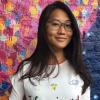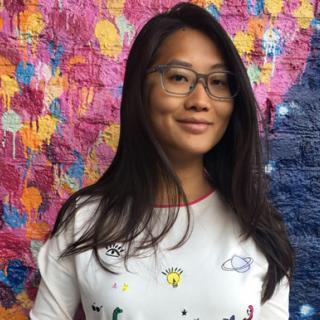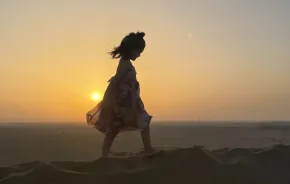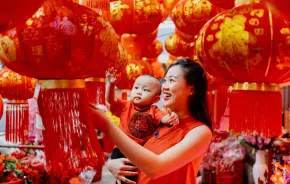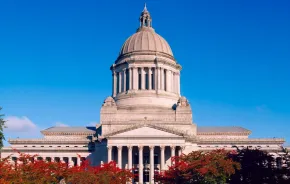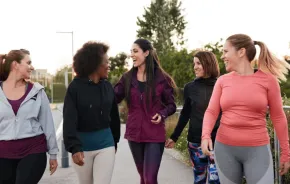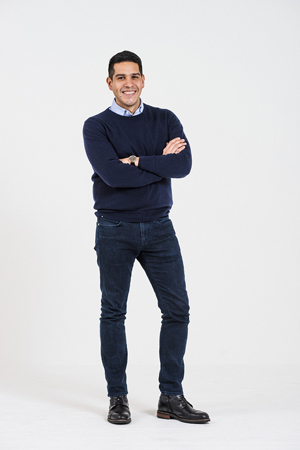
“You are my other me” is the first translated line of “In Lak’ech,” a poem Luis Ortega reads to himself before every event or discussion in which he takes part. Written by playwright Luis Valdez, the poem reminds Ortega that we are all connected — a mutuality that has driven and inspired his amazing work for 15 years.
Ortega is the founder and director of Storytellers for Change, an organization that works with schools, foundations and nonprofits to provide storytelling programs and create spaces of inclusion, empathy and equity. He has traveled to hundreds of schools to speak about the power of stories, including moments of impossibility in his own narrative that he has turned into reality: For instance, being told he would never learn to speak English, or that “people like him” (i.e., those who are undocumented) couldn’t go to college.
Ortega is also a consultant for the Bill & Melinda Gates Foundation Discovery Center and coordinates its Youth Ambassador Program. For the past five years, he has worked with more than 100 high school students to foster inclusion and belonging. And in collaboration with design lab Amplifier and his Youth Ambassadors, Ortega helped bring to life the current “We the Future” exhibit, which highlights the work of 10 powerful young activists in a brave, intentional space designed to engage youth in challenging dialogues with courage and empathy.
Courage and empathy characterize Ortega as a true superhero and mentor to those with whom he works.
“Luis’ work and impact knows no bounds,” says Gian Angelo Roque, a Youth Ambassador and junior at Mercer Island High School. “His ability to see things from other people’s perspectives makes him so genuine and caring.”
What do you wish people understood about your work?
As a person of color, as an immigrant and as someone who has an accent, I’m continuously having to battle stereotypes and racism. My personal mission and my mission at my work is to create a world of belonging by sharing stories that allow communities to be able to see each other, not as the same but as different, and that difference doesn’t have to mean that we cannot coexist in harmony and with empathy. It’s difficult to work to build a world of belonging where a lot of times your personal experience is one of othering and one of not belonging. But I think it is precisely in hardship and in feeling excluded that we can also find the reason and the hope for engaging in this work.
What’s one small action our readers can take in their own lives to make positive change happen?
Reflect on where in your life you need to create a brave space, whether it is at your place of work or even at home. This world is in urgent need of more dialogue. Sometimes the brave space needs to start with our own selves, having a space where we can reaffirm our identities and also explore what, if any, stories around us we need to be aware of, because I think that’s where empathy starts. … And often what expands our circle of human concern is our proximity to the stories of those who have lived different lives than ours.
Who is your personal hero?
A collection of three people: my grandmothers and my mom. The three of them were teachers. Growing up, what each one of them emphasized for me in their own way was that teaching is about relationships and a commitment to being in a collective journey for liberation. As a young kid, having the opportunity to have those conversations be part of everyday life really shaped for me, from a very young age, this sense of purpose and understanding that I have a voice, that I have something to contribute to this world, that teaching didn’t only have to happen in the classroom and that teaching is a way to show up for other people.
How do you measure progress in your work?
Part of my job over the last couple of years has been to develop mechanisms through which to evaluate the impact of storytelling. But I think the biggest impact for me is that, despite how much difficulty I face and how challenging it is to facilitate dialogues on oppression, racism and systemic discrimination, I have remained very hopeful and very committed to building identity and a sense of belonging for everyone. If I can walk away from a space sensing there was an authentic moment of vulnerable truth-telling and healing, then that gives me hope.
What is your best advice for today’s parents who want to raise and support their kids to achieve big ambitions?
Model courage and empathy early on. The biggest thing anyone can do is to care for another human being. Something that worries me is that at times it feels like we are making our efforts to be about the outcome. But if in the process of doing that, we’re not taking care of each other and the people around us, then I question the possible impact of those efforts. Nothing’s more important than learning to slow down and show empathy for a person who’s right next to us.
If you could have a superpower, what would it be?
The power to heal.
If you could dine with anyone, living or dead, whom would that be and why?
My grandfather. I never met him, but I grew up surrounded by his books, his paintings; and my mom and my grandma always described him with such loving words and have told me that I remind them of him. I would just love to share a meal with him.
Favorite read of the past year?
“Emergent Strategy” by Adrienne Maree Brown. The book speaks about the many lessons that we can learn from nature about how to deal with systems of harmony and produce positive change and growth.
What did you want to be when you were a very young kid?
A teacher. I come from a family of teachers — my dad’s also a teacher, and I have seven sisters and they’re all teachers. I’m the least conventional teacher out of all of us.
If you could destroy one myth, what would it be?
The myth of hierarchy based on race.
Fill in the blank: What the world needs now is __________.
Belonging.
What book do you think every kid should read?
I think every parent should read “Between the World and Me” by Ta-Nehisi Coates, and every young person [of high school age] who cares about activism and changing the world should read “On the Other Side of Freedom: The Case for Hope” by DeRay Mckesson.



